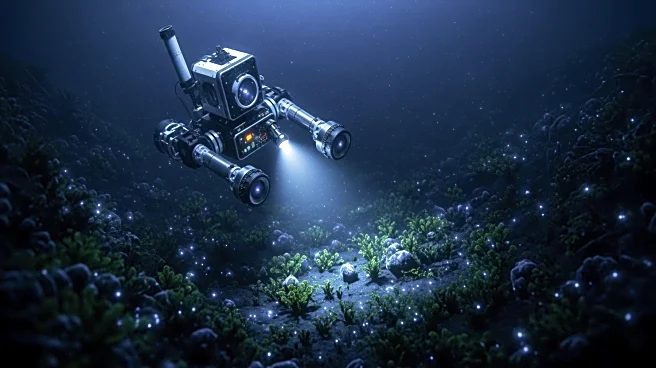What's Happening?
Researchers from the University of Bremen's Geosciences Department have uncovered microbial life in one of the planet's most alkaline underwater environments, with a pH of 12. Led by first author Palash Kumawat, the team used lipid biomarkers to analyze
the survival strategies of microbes in this harsh setting. These biomarkers, specialized fat molecules, reveal biological activity and provide insights into how methane- and sulfate-metabolizing microbes endure such extreme conditions. The study highlights the role of these microbes in the global carbon cycle, as they process carbon and other elements independently of the ocean above. The research also distinguishes between modern and ancient microbial populations by combining isotope data with lipid biomarkers, offering a glimpse into both active and fossilized microbial communities.
Why It's Important?
The discovery of microbial life in such extreme conditions is significant for understanding the global carbon cycle and the potential origins of life. These microbes contribute to the production of methane, a greenhouse gas, and operate in a self-contained ecosystem, drawing energy from minerals and gases rather than sunlight. This research expands knowledge of how life can exist in hostile environments, which may have implications for studying primordial life and the conditions under which it could have originated. The findings also underscore the importance of deep-sea microbial communities in processing carbon, which has broader implications for climate science and environmental policy.
What's Next?
Building on these findings, the research team plans to cultivate the discovered microorganisms in controlled incubators to further study their nutrient acquisition and survival mechanisms. This could lead to a deeper understanding of how life persists in inhospitable environments and inform future research on extremophiles. The study is part of the Cluster of Excellence 'The Ocean Floor -- Earth's Uncharted Interface,' which aims to explore the ocean's depths and uncover new scientific insights. Continued exploration and sampling in regions like the Mariana forearc could reveal more about the hidden ecosystems beneath the ocean floor.
Beyond the Headlines
The discovery raises questions about the ethical and environmental implications of deep-sea exploration and the potential impact on these fragile ecosystems. Understanding the resilience and adaptability of microbial life in extreme conditions could inform biotechnological applications, such as developing new methods for carbon capture or bioengineering. Additionally, the research may influence cultural perceptions of life and its potential existence in other extreme environments, such as those found on other planets.
















